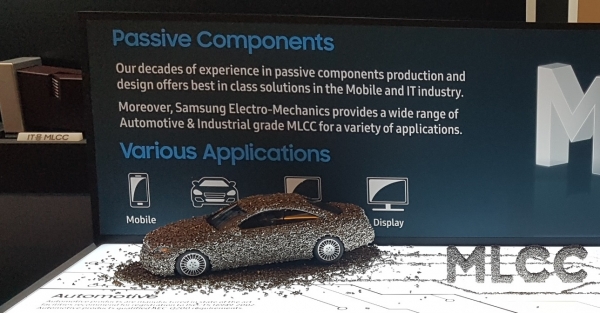Company aims for world No.1 in IT MLCC by 2025

Samsung Electro-Mechanics has extended its contract on patents related to multi layer ceramic capacitor (MLCC) with Murata Manufacturing, CEO of the Korean company confirmed on Wednesday.
Company CEO Kyung Kye-hyun was responding to questions from shareholders during its annual shareholders’ meeting.
However, Kyung declined to share the specifics on the extended contract.
It is unknown whether Samsung Electro-Mechanics was able to add patents related to MLCC for automotive. The status of licensing fees also remain unknown.
The pair signed their cross-licensing agreement in 2012 after ending their patent lawsuits. Samsung had won its lawsuit filed to the International Trade Commission against it Japanese rival in 2011.
The companies didn’t pay licensing fees to each other under the initial terms of the contract.
Samsung Electro-Mechanics has narrowed its gap in MLCC for IT applications with Murata, but remains behind in MLCC for automotive.
Kyung said the South Korean component maker will expand its market share in MLCC for automotive by three to four times going forward.
The company currently only holds share in the single-digits in the sector. Murata, TDK and Taiyo Yuden dominates the market. Murata is the world leader.
In 2019, Samsung had said it aims to become the world number two by 2022.
At the shareholders’ meeting, Kyung also said the company is aiming to become the world leader in MLCC for IT applications by 2025. Murata is also the leader in the sector. Kyung said Samsung was aiming to become the leader in the sector the first, then become in leader in other areas as well.
Samsung was also aiming to grow 11% this year in the worldwide electronic components market. The company is aiming to expand its sales by 1.5 times in 2025 compared to 2019’s 7.7 trillion won. It will also reduce its reliance on Samsung Electronics, the CEO said. Its reliance to the electronic makes was 44% in 2019, but this was reduced to 34% in 2020. This year’s goal will be 30%, while in the long-term the company aimed to lower it below 20%.
Samsung Electro-Mechanics posted 8.2 trillion won in sales and 829.1 billion won in operating income last year. This was beneath its goal set in 2019 but higher than expected as it performed well in March when the pandemic was spreading, the CEO explained.


